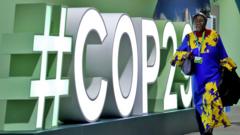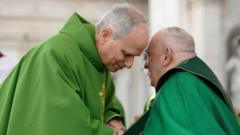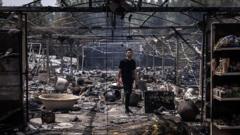A letter to the UN from notable figures critiques host countries’ commitment to climate action, warning current talks fail to address urgent climate needs.
COP Climate Talks Under Fire: Experts Call for Overhaul Amid Fossil Fuel Focus

COP Climate Talks Under Fire: Experts Call for Overhaul Amid Fossil Fuel Focus
Prominent climate experts declare COP climate talks insufficient as pressure mounts for fossil fuel phase-out reforms.
The recent COP climate talks in Baku, Azerbaijan, have ignited a fierce debate about their efficacy, with prominent scientists and former UN leaders declaring the process "no longer fit for purpose." This statement comes amid criticisms that host nations should not be able to lead discussions if they lack the commitment to phase out fossil fuels.
Azerbaijan's President Ilham Aliyev made headlines this week when he referred to natural gas as a "gift from God" during his address at COP29. This remark followed a report from the BBC indicating that a senior official had attempted to facilitate fossil fuel deals during the conference.
The last few years have seen progress in tackling climate issues, particularly with the Paris Agreement of 2015, which set ambitious goals for curbing global temperature increases to under 1.5 degrees Celsius. Countries pledged to transition from fossil fuels and triple renewable energy capacity by 2030.
However, the authors of the recent letter highlight that the current slow-moving COP framework cannot match the urgent demands of the climate crisis. They include influential figures such as former UN Secretary General Ban Ki-moon and former UN climate chief Christiana Figueres.
Despite acknowledging recent achievements, the authors express concern over the lack of effective action, particularly following an increase in greenhouse gas emissions by nearly 1% after agreements were made at COP28. To avoid breaching the critical 1.5-degree threshold, scientists argue that emissions must be reduced by 42% before the decade’s end.
Figueres later clarified her stance, emphasizing the vital role of the COP process in fostering necessary systemic change while reaffirming their support for improving the structure for climate action.
The current COP discussions have drawn specific ire from representatives of small island states, who fear exclusion from major decisions dominated by larger emitters within groups like the G20. Rigorous scrutiny is also placed on the choice of host nations, with concerns that recent oil-producing hosts may conflict with the very goals of the climate talks.
In the weeks leading up to COP29, reports surfaced of Azerbaijan's chief executive discussing investment opportunities tied to their oil and gas industry, raising alarms about the country’s commitment to significant climate action. Aliyev defended their oil and gas exports, claiming that resource-rich nations shouldn't be penalized for capitalizing on their assets.
This critique of the Azerbaijan COP hosting illustrates a growing sentiment that countries leading these significant climate discussions must hold high ambitions in alignment with the Paris Agreement. The authors propose more frequent COP meetings with enhanced accountability, urging substantial reforms to address the demanding realities of climate change as the global community strives for a safer future.
Azerbaijan's President Ilham Aliyev made headlines this week when he referred to natural gas as a "gift from God" during his address at COP29. This remark followed a report from the BBC indicating that a senior official had attempted to facilitate fossil fuel deals during the conference.
The last few years have seen progress in tackling climate issues, particularly with the Paris Agreement of 2015, which set ambitious goals for curbing global temperature increases to under 1.5 degrees Celsius. Countries pledged to transition from fossil fuels and triple renewable energy capacity by 2030.
However, the authors of the recent letter highlight that the current slow-moving COP framework cannot match the urgent demands of the climate crisis. They include influential figures such as former UN Secretary General Ban Ki-moon and former UN climate chief Christiana Figueres.
Despite acknowledging recent achievements, the authors express concern over the lack of effective action, particularly following an increase in greenhouse gas emissions by nearly 1% after agreements were made at COP28. To avoid breaching the critical 1.5-degree threshold, scientists argue that emissions must be reduced by 42% before the decade’s end.
Figueres later clarified her stance, emphasizing the vital role of the COP process in fostering necessary systemic change while reaffirming their support for improving the structure for climate action.
The current COP discussions have drawn specific ire from representatives of small island states, who fear exclusion from major decisions dominated by larger emitters within groups like the G20. Rigorous scrutiny is also placed on the choice of host nations, with concerns that recent oil-producing hosts may conflict with the very goals of the climate talks.
In the weeks leading up to COP29, reports surfaced of Azerbaijan's chief executive discussing investment opportunities tied to their oil and gas industry, raising alarms about the country’s commitment to significant climate action. Aliyev defended their oil and gas exports, claiming that resource-rich nations shouldn't be penalized for capitalizing on their assets.
This critique of the Azerbaijan COP hosting illustrates a growing sentiment that countries leading these significant climate discussions must hold high ambitions in alignment with the Paris Agreement. The authors propose more frequent COP meetings with enhanced accountability, urging substantial reforms to address the demanding realities of climate change as the global community strives for a safer future.






















